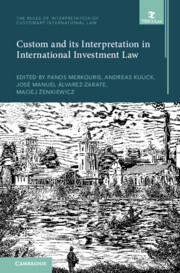52 results
Part IV - Concluding Thoughts
-
- Book:
- Custom and its Interpretation in International Investment Law
- Published online:
- 04 January 2024
- Print publication:
- 18 January 2024, pp 333-345
-
- Chapter
-
- You have access
- Open access
- HTML
- Export citation
14 - Custom and Its Interpretation in International Investment Law
- from Part IV - Concluding Thoughts
-
-
- Book:
- Custom and its Interpretation in International Investment Law
- Published online:
- 04 January 2024
- Print publication:
- 18 January 2024, pp 335-345
-
- Chapter
-
- You have access
- Open access
- HTML
- Export citation
Copyright page
-
- Book:
- Custom and its Interpretation in International Investment Law
- Published online:
- 04 January 2024
- Print publication:
- 18 January 2024, pp iv-iv
-
- Chapter
-
- You have access
- Open access
- HTML
- Export citation
Table of Cases
-
- Book:
- Custom and its Interpretation in International Investment Law
- Published online:
- 04 January 2024
- Print publication:
- 18 January 2024, pp xvi-xxxv
-
- Chapter
-
- You have access
- Open access
- HTML
- Export citation
Foreword: Custom and International Investment Law
-
- Book:
- Custom and its Interpretation in International Investment Law
- Published online:
- 04 January 2024
- Print publication:
- 18 January 2024, pp xiv-xv
-
- Chapter
-
- You have access
- Open access
- HTML
- Export citation
Index
-
- Book:
- Custom and its Interpretation in International Investment Law
- Published online:
- 04 January 2024
- Print publication:
- 18 January 2024, pp 374-379
-
- Chapter
-
- You have access
- Open access
- HTML
- Export citation
Part III - Interpreting Customary International Rules
-
- Book:
- Custom and its Interpretation in International Investment Law
- Published online:
- 04 January 2024
- Print publication:
- 18 January 2024, pp 231-332
-
- Chapter
-
- You have access
- Open access
- HTML
- Export citation
Contents
-
- Book:
- Custom and its Interpretation in International Investment Law
- Published online:
- 04 January 2024
- Print publication:
- 18 January 2024, pp v-vii
-
- Chapter
-
- You have access
- Open access
- HTML
- Export citation
Contributors
-
- Book:
- Custom and its Interpretation in International Investment Law
- Published online:
- 04 January 2024
- Print publication:
- 18 January 2024, pp viii-xiii
-
- Chapter
-
- You have access
- Open access
- HTML
- Export citation
Part II - The Interpretation of Secondary Rules in International Investment Law
-
- Book:
- Custom and its Interpretation in International Investment Law
- Published online:
- 04 January 2024
- Print publication:
- 18 January 2024, pp 91-230
-
- Chapter
-
- You have access
- Open access
- HTML
- Export citation
Abbreviations
-
- Book:
- Custom and its Interpretation in International Investment Law
- Published online:
- 04 January 2024
- Print publication:
- 18 January 2024, pp xlvii-lii
-
- Chapter
-
- You have access
- Open access
- HTML
- Export citation
Bibliography
-
- Book:
- Custom and its Interpretation in International Investment Law
- Published online:
- 04 January 2024
- Print publication:
- 18 January 2024, pp 346-373
-
- Chapter
-
- You have access
- Open access
- HTML
- Export citation
Part I - Identifying Custom in International Investment Law
-
- Book:
- Custom and its Interpretation in International Investment Law
- Published online:
- 04 January 2024
- Print publication:
- 18 January 2024, pp 1-90
-
- Chapter
-
- You have access
- Open access
- HTML
- Export citation
Table of International Treaties, Documents & National Legislation
-
- Book:
- Custom and its Interpretation in International Investment Law
- Published online:
- 04 January 2024
- Print publication:
- 18 January 2024, pp xxxvi-xlvi
-
- Chapter
-
- You have access
- Open access
- HTML
- Export citation

Custom and its Interpretation in International Investment Law
-
- Published online:
- 04 January 2024
- Print publication:
- 18 January 2024
-
- Book
-
- You have access
- Open access
- Export citation
PART I - Introduction, Theory and Domestic Law Approaches
-
- Book:
- Reassertion of Control over the Investment Treaty Regime
- Published online:
- 12 January 2017
- Print publication:
- 15 December 2016, pp 1-2
-
- Chapter
- Export citation
Contents
-
- Book:
- Reassertion of Control over the Investment Treaty Regime
- Published online:
- 12 January 2017
- Print publication:
- 15 December 2016, pp v-vi
-
- Chapter
- Export citation
List of Contributors
-
- Book:
- Reassertion of Control over the Investment Treaty Regime
- Published online:
- 12 January 2017
- Print publication:
- 15 December 2016, pp vii-x
-
- Chapter
- Export citation
PART IV - Reassertion of Control: Policy and Trends
-
- Book:
- Reassertion of Control over the Investment Treaty Regime
- Published online:
- 12 January 2017
- Print publication:
- 15 December 2016, pp 283-284
-
- Chapter
- Export citation
6 - State-State Investment Arbitration as a Means of Reassertion of Control: From Antagonism to Dialogue
- from PART II - Procedural Aspects and Avenues of Reassertion
-
-
- Book:
- Reassertion of Control over the Investment Treaty Regime
- Published online:
- 12 January 2017
- Print publication:
- 15 December 2016, pp 128-152
-
- Chapter
- Export citation



